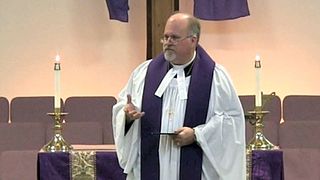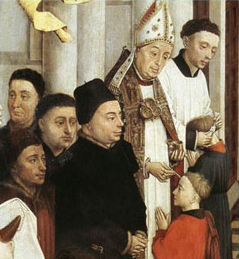A bishop is an ordained, consecrated, or appointed member of the Christian clergy who is generally entrusted with a position of authority and oversight.

In the Christian churches, holy orders are ordained ministries such as bishop, priest, or deacon, and the sacrament or rite by which candidates are ordained to those orders. Churches recognizing these orders include the Catholic Church, the Eastern Orthodox, Oriental Orthodox, Anglican, Assyrian, Old Catholic, Independent Catholic and some Lutheran churches. Except for Lutherans and some Anglicans, these churches regard ordination as a sacrament. The Anglo-Catholic tradition within Anglicanism identifies more with the Roman Catholic position about the sacramental nature of ordination.
A parish is a territorial entity in many Christian denominations, constituting a division within a diocese. A parish is under the pastoral care and clerical jurisdiction of a parish priest, who might be assisted by one or more curates, and who operates from a parish church. Historically, a parish often covered the same geographical area as a manor. Its association with the parish church remains paramount.

A deacon is a member of the diaconate, an office in Christian churches that is generally associated with service of some kind, but which varies among theological and denominational traditions. Some Christian churches, such as the Catholic Church, the Eastern Orthodox Church and the Anglican church, view the diaconate as part of the clerical state; in others, the deacon remains a layperson.

The Reverend is an honorific style most often placed before the names of Christian clergy and ministers. There are sometimes differences in the way the style is used in different countries and church traditions. The Reverend is correctly called a style but is often and in some dictionaries called a title, form of address or title of respect. The style is also sometimes used by leaders in non-Christian religions such as Judaism and Buddhism.
Full communion is a communion or relationship of full understanding among different Christian denominations that share certain essential principles of Christian theology. Views vary among denominations on exactly what constitutes full communion, but typically when two or more denominations are in full communion it enables services and celebrations, such as the Eucharist, to be shared among congregants or clergy of any of them with the full approval of each.

Ash Wednesday is a Christian holy day of prayer, fasting, even if it is not a holy day of obligation. It is preceded by Shrove Tuesday and falls on the first day of Lent, the six weeks of penitence before Easter. Ash Wednesday is traditionally observed by Western Christians, including Anglicans, Episcopalians, Lutherans, Old Catholics, Methodists, Presbyterians, some Baptists, some Nazarenes, and most Latin Rite Roman Catholics.
Ordination is the process by which individuals are consecrated, that is, set apart as clergy to perform various religious rites and ceremonies. The process and ceremonies of ordination vary by religion and denomination. One who is in preparation for, or who is undergoing the process of ordination is sometimes called an ordinand. The liturgy used at an ordination is sometimes referred to as an ordination.
The Christian left is a range of centre-left and left-wing Christian political and social movements that largely embrace social justice viewpoints and uphold a social gospel. Given the inherent diversity in international political thought, the term can have different meanings and applications in different countries. Although there is some overlap, the Christian left is distinct from liberal Christianity, meaning not all Christian leftists are liberal Christians, and vice versa. Some Christian leftists have socially conservative views on social issues but lean left on economic issues.

Open communion is the practice of some Protestant Churches of allowing members and non-members to receive the Eucharist. Many but not all churches that practice open communion require that the person receiving communion be a baptized Christian, and other requirements may apply as well. In Methodism, open communion is referred to as the open table.

In Christianity, a minister is a person authorized by a church, or other religious organization, to perform functions such as teaching of beliefs; leading services such as weddings, baptisms or funerals; or otherwise providing spiritual guidance to the community. The term is taken from Latin minister, which itself was derived from minus ("less").

The hierarchy of the Catholic Church consists of its bishops, priests, and deacons. In the ecclesiological sense of the term, "hierarchy" strictly means the "holy ordering" of the Church, the Body of Christ, so to respect the diversity of gifts and ministries necessary for genuine unity.

Confirmation is one of the seven sacraments of the Catholic Church. It is the one of the three sacraments of initiation into the Catholic Church, the other two being Baptism and Holy Communion.

The sacrament of holy orders in the Catholic Church includes three orders: bishop, priest, and deacon. In the phrase "holy orders", the word "holy" simply means "set apart for some purpose." The word "order" designates an established civil body or corporation with a hierarchy, and ordination means legal incorporation into an order. In context, therefore, a group with a hierarchical structure that is set apart for ministry in the Church.

The priesthood is one of the three holy orders of the Catholic Church, comprising the ordained priests or presbyters. The other two orders are the bishops and the deacons. Only men are allowed to receive holy orders, and the church does not allow any transgender people to do so. Church doctrine also sometimes refers to all baptised Catholics as the "common priesthood".

There are seven sacraments of the Catholic Church, which according to Catholic theology were instituted by Jesus and entrusted to the Church. Sacraments are visible rites seen as signs and efficacious channels of the grace of God to all those who receive them with the proper disposition. The sevenfold list of sacraments is often organized into three categories: the sacraments of initiation, consisting of Baptism, Confirmation, and the Eucharist; the sacraments of healing, consisting of Reconciliation and Anointing of the Sick; and the sacraments of service: Holy Orders and Matrimony.
A number of Catholic priests have served in civil office. In keeping with the principle of separation of church and state, the Catholic Church discourages this practice.
Canon 844 is a Catholic Church canon law contained within the 1983 Code of Canon Law, which defines the licit administration and reception of certain sacraments of the Catholic Church in normative and in particular exceptional circumstances.













